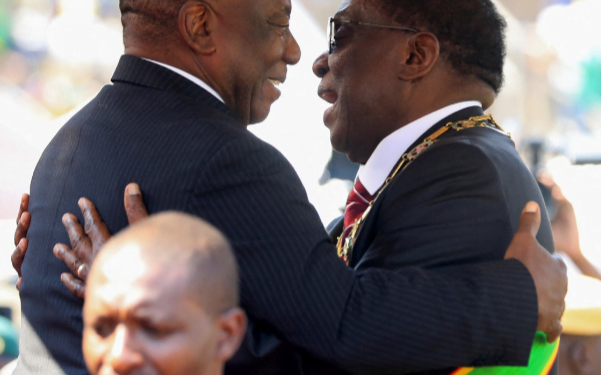A home affairs official accused of “serious misconduct” for an embarrassing diplomatic travel bungle that delayed a delegation led by President Cyril Ramaphosa in Zimbabwe has failed to convince the labour court he should not be recalled to face the music.
Castro Mlaba is employed by the department of home affairs as first secretary: immigration and civic services in Harare. His duties include travel arrangements and diplomatic processing of South African dignitaries visiting the country.
But things went awry on September 4 when Ramaphosa attended the inauguration of Zimbabwean President Emmerson Mnangagwa and was delayed, with his entourage, for “over an hour” at Harare International Airport. The knock-on effect then delayed the departure from the airport of the president of the Democratic Republic of Congo.
“As far the department was concerned, this failure … constituted serious misconduct and brought the Republic of South Africa into disrepute,” read a ruling handed down by the Johannesburg labour court.
Mlaba initially said he felt “embarrassed, scared and unprofessional” about the incident but dropped his conciliatory approach and went on the offensive when the department rejected his representations and insisted he return home by October 13 to face a disciplinary hearing.
He then took home affairs minister Aaron Motsoaledi and the department’s director-general to the labour court, arguing that “the misconduct allegation [against] him must first be proven in a hearing” and “equated the recall to a termination of contract, and contended that such termination was not based on any legislative provision”.
Mlaba complained that the recall was too harsh a sanction because he would be forfeiting the benefits he would have earned during his stint in a foreign mission.
The judgment explained that Mlaba was supposed to be at the airport two hours before Ramaphosa departed to “ensure that the travel documents of the entire delegation are processed without delay and the departure of the entire delegation is assured without any delays or administrative difficulties”.
“According to the department, [Mlaba] failed to discharge this clear duty on him. As a result, the president and his delegation were delayed for over an hour at Harare airport,” read the judgment.
The repercussions came two days later when the department, through its attorneys, wrote to Mlaba, informing him the incident was regarded as “serious misconduct” and he would be transferred back to SA. He was given an opportunity to respond in writing.
“[He] provided an extensive blow by blow exposition of the events, as he saw it, on September 4. He explained that there had been changes in the travel arrangements relating to departure time of the president and his delegation,” read the judgment.
“He stated that he was not aware of these changes because his telephone was not connected to a Wi-Fi network due to some ‘signal jam’. According to [him] he became aware of the change in departure time only when the president and his delegation were already on their way to the airport.
“He then tried to rush to the airport, but traffic was congested and he arrived late. He stated that he attempted to explain the situation and tender his apologies to the president, but he was not allowed to do so.
He confirmed that he felt ‘embarrassed, scared and unprofessional’ as a result of what happened. He pleaded for lenience, saying the decision to recall him ‘appears quite severe’, especially considering his actions were neither intentional nor premeditated.”
He “also made a number of submissions as to his personal circumstances, as motivation why he should not be recalled and transferred back to South Africa”.
“He concluded by tendering his apology for what happened. He took the court route after the department rejected his representations.
“It was also stated that due to the severity of the misconduct, the reasons provided by Mlaba were not sufficient to prevent his recall. It was pointed out that his actions had far-reaching implications for the reputation and credibility of the department and the department of international relations and co-operation, and the department had to safeguard its interests,” read the judgment.
Mlaba “immediately dropped his conciliatory approach and went on the offensive”.
“[He] even said that his previous apology should not be considered as an admission of guilt.”
He approached the labour court on an urgent basis, but his application was dismissed last Thursday because he “simply has not established a clear right to the relief sought”.
“The fact that he may suffer prejudice considering his personal circumstances cannot change this. His application thus falls to be dismissed,” read the judgment.
However, Mlaba was spared legal costs.
Source NewZimbabwe










